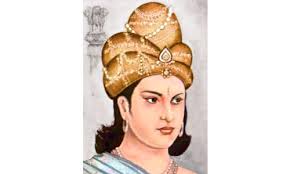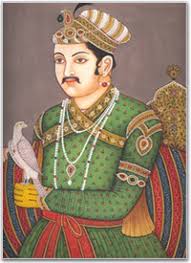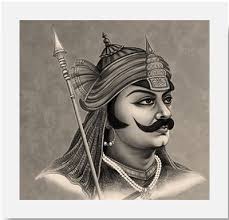RULERS
OF INDIA
Ashoka
 Ashoka Maurya ( 304–232 BCE), commonly known as Ashoka and Ashoka the Great, was an Indian emperor of the Maurya Dynasty who ruled almost all of the Indian subcontinent from c. 268 to 232 BCE.
Ashoka Maurya ( 304–232 BCE), commonly known as Ashoka and Ashoka the Great, was an Indian emperor of the Maurya Dynasty who ruled almost all of the Indian subcontinent from c. 268 to 232 BCE.
One of India's greatest emperors, Ashoka reigned over a realm that stretched from the Hindu Kush mountains in Afghanistan to the modern state of Bangladesh in the east. It covered the entire Indian subcontinent except parts of present-day Tamil Nadu and Kerala.
The empire's capital was Pataliputra (in Magadha, present-day Bihar), with provincial capitals at Taxila and Ujjain.
In about 260 BCE, Ashoka waged a bitterly destructive war against the state of Kalinga (modern Odisha).He conquered Kalinga, which none of his ancestors had done.
He embraced Buddhism after witnessing the mass deaths of the Kalinga War, which he himself had waged out of a desire for conquest.
"Ashoka reflected on the war in Kalinga, which reportedly had resulted in more than 100,000 deaths and 150,000 deportations.Ashoka converted gradually to Buddhism beginning about 263 BCE.
He was later dedicated to the propagation of Buddhism across Asia, and established monuments marking several significant sites in the life of Gautama Buddha. "Ashoka regarded Buddhism as a doctrine that could serve as a cultural foundation for political unity. Ashoka is now remembered as a philanthropic administrator.
In the Kalinga edicts, he addresses his people as his "children", and mentions that as a father he desires their good.
Muhhamad
jallal-ud-din akbar
 Jalal ud-din Muhammad Akbar, popularly known as Akbar literally "the great"; (15 October 1542– 27 October 1605) and later Akbar the Great was Mughal Emperor from 1556 until his death.
Jalal ud-din Muhammad Akbar, popularly known as Akbar literally "the great"; (15 October 1542– 27 October 1605) and later Akbar the Great was Mughal Emperor from 1556 until his death.
He was the third and one of the greatest rulers of the Mughal Dynasty in India. Akbar succeeded his father, Humayun, under a regent, Bairam Khan, who helped the young emperor expand and consolidate Mughal domains in India.
A strong personality and a successful general, Akbar gradually enlarged the Mughal Empire to include nearly all of the Indian Subcontinent north of the Godavari river.
His power and influence, however, extended over the entire country because of Mughal military, political, cultural, and economic dominance. To unify the vast Mughal state, Akbar established a centralised system of administration throughout his empire and adopted a policy of conciliating conquered rulers through marriage and diplomacy.
In order to preserve peace and order in a religiously and culturally diverse empire, he adopted policies that won him the support of his non-Muslim subjects.
Eschewing tribal bonds and Islamic state identity, Akbar strived to unite far-flung lands of his realm through loyalty, expressed through a Persianised culture, to himself as an emperor who had near-divine status.
Maharana
pratap
 Pratap Singh (9 May 1540 – 29 January 1597) was the ruler of Mewar, a region in north-western India in the present day state of Rajasthan. His birth anniversary (Maharana Pratap Jayanti) is celebrated as a full-fledged festival every year on the 3rd day of the Jyestha Shukla phase.
Pratap Singh (9 May 1540 – 29 January 1597) was the ruler of Mewar, a region in north-western India in the present day state of Rajasthan. His birth anniversary (Maharana Pratap Jayanti) is celebrated as a full-fledged festival every year on the 3rd day of the Jyestha Shukla phase.
He was the eldest son of Maharani Jaiwanta Bai and Udai Singh II, founder of Udaipur.
He belonged to the Sisodia clan of Rajputs. Maharana Pratap Singh is widely regarded as a fearless warrior and ingenious strategist, who successfully fought the Mughals and safeguarded his people until his death.
In popular Indian culture, he is hailed as an inspirational figure for exemplifying gallantry and resourcefulness.
He was succeeded by his eldest son Amar Singh I.
Pratap died of injuries sustained in a hunting accident at Chavand, which served as his capital, on 29 January 1597, aged fifty-seven.
A chhatri, commemorating Pratap's funeral, exists at Chavand and is an important tourist attraction.